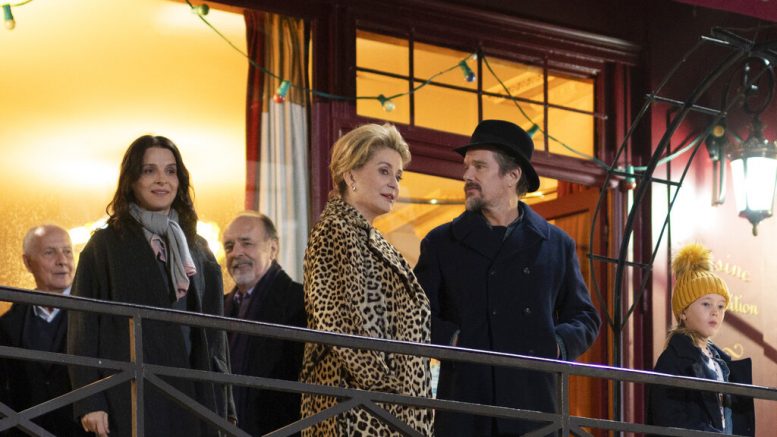The Associated Press
Family may be the great subject of Japanese filmmaker Hirokazu Kore-eda, but he doesn’t draw straightforward portraits. In Kore-eda’s hands, family is more malleable. He tends to shift roles around like he’s rearranging furniture, subtly remaking familiar dynamics until he has, without you knowing it, undone everything.
In his delicate, devastating and deeply humane films, family works like a prism, a way to see things often obscured in Japanese society. In “Like Father, Like Son,” a switched-at-birth tale (usually the stuff of melodrama) is used to delicately render class divisions. In “Nobody Knows,” four children of different fathers and one mother for a moment find harmony together. In his Palme d’Or-winning “Shoplifters,” a makeshift and impoverished clan are a truer family than most that are bound by DNA.
For Kore-eda, family is a choice. And in his latest and first French-language film, “The Truth,” it’s a choice that his central character — a celebrated French actor played by Catherine Deneuve — has seemingly abdicated. “I prefer to have been a bad mother, a bad friend and a good actress,” she says without regret.
Kore-eda has shifted from Japan to Paris. Fabienne (Deneuve) is a grand dame of French cinema not so unlike Deneuve, herself, who is visited by what she calls the “little family” of her daughter, Lumin (Juliette Binoche) from New York. With Lumin are her actor husband Hank (Ethan Hawke) and daughter Charlotte (Clémentine Grenier). They arrive just as Fabienne’s not entirely factual memoir, titled “The Truth,” is being published. “My memories, my book,” she says.
The visit takes place while Fabienne is filming a science-fiction film as an ageless, space-traveling mother — another layer of fiction in “The Truth” that serves as a part authentic, part false refraction of who Fabienne is as a mother. She can act the part, but can she actually be it?
Lumin certainly doesn’t think so. She carries with her plenty of childhood baggage from Fabienne’s less than caring upbringing, including the time Fabienne locked her in the basement as punishment and then forgot to let her out. “I was shooting,” she says matter-of-factly, like her priorities were squarely in order.
But “The Truth” steadily chips away at some of those old grievances, causing Lumin to question her recollections and soften under Fabienne’s indomitable will. (“You can’t trust memories,” her mother tells her. “Memories come and go.”)
The conflicts, including Hank’s drinking problem, are a little familiar and the film’s sensibility at times verges on the territory of countless other French dramas. Kore-eda shot the film with a French crew, directing through a translator, and an element of his gentle brilliance doesn’t come through quite as clearly in translation.
But “The Truth” is still often masterful in delicately balancing conflicting ideas at once. And, besides, Deneuve. The once and always belle du jour doesn’t overwhelm the film with winks to her own storied past; she simply commands it by her own formidable presence. Her Fabienne — cruelly cutting, wholly remorseless, sensationally talented — is too alive for mere homage. She wouldn’t stand it for it, besides.
There are moments when she and Binoche share the screen that are almost overwhelming for how simply good — in vastly different ways — both actors are. And then there are notes of grace like when the whole shambling clan stumbles into the night from a restaurant and begins dancing arm in arm to a street musician’s music. All family life is a performance. And Kore-eda has somehow done it again.
“The Truth,” an IFC Films release, is rated PG by the Motion Picture Association of America for thematic and suggestive elements, and for smoking and brief language. Running time: 106 minutes. Three stars out of four.




































